A Feminist Message of Acceptance and Love in “Troop Zero” by Mattie Branson-Meyer
“I am Christmas Flint, human female. I think you’d like me. I think you’d wanna be my friend.” (Troop Zero, 0:02:12-25)
Background and Summary:
The film “Troop Zero” opens on a young girl named Christmas Flint, sitting in a lawn chair, wearing a tinfoil-covered colander on her head, and using a flashlight to try to signal aliens. Christmas lives in the rural town of Wiggly, Georgia in 1977, and she is an odd girl: she doesn’t have any friends that are girls, she only seems to have one friend in general, and she spends most of her time looking up at the stars. Her mama–– who fed Christmas’s love of space and all it contains–– died the previous year. In order to manage this loss, Christmas becomes even more obsessed with contacting the aliens, believing that if she can contact them, she can contact her mother.
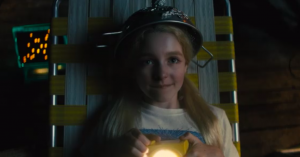
The film is set in 1977, the same year that NASA launched Voyager with its golden record containing sounds and snapshots of life on Earth. Christmas and her friend Joseph overhear a NASA scientist telling the local Birdie Scouts (similar to Girl Scouts) that one Birdie Scout troop across the state of Georgia will be selected to record a message on the record. From then on, it becomes Christmas’s mission to get her voice on that record to be heard by aliens, and hopefully by her mother as well.
However, (light spoilers), Christmas is weird. She has unconventional interests, and there’s a rumor that she wets the bed. Wiggly’s Birdie Scouts refuse to let her join, so she sets about creating her own troop. After asking nearly everyone in town, she manages to convince four others to join her: Joseph (who is more interested in cheerleading than in playing football like the rest of his family), Anne-Claire (a one-eyed young evangelist), Hell-No (the local bully), and Hell-No’s friend and sidekick Smash (who doesn’t say much, but grunts and smashes objects to get her point across). Their troop mother isn’t the conventional troop leader either. Rayleen is a hardened, chain-smoking employee of Christmas’s father, and only relents after much begging from the father and daughter. The mismatched troop then sets off to win one Birdie Scout badge each so they can perform at that year’s Jamboree, where the prize is getting their voice and message on the Golden Record.
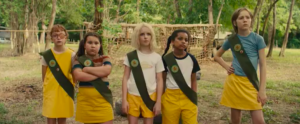
How is “Troop Zero” a Feminist and Intersectional Text? What Does it Address?
Gender:
The members of Troop Zero–– the Birdie Scout troop number given to Christmas and her newfound community–– are viewed as outsiders because they do not necessarily conform to society’s expectations of their gender identity.
Christmas loves science. She likes to explore the outdoor world and she doesn’t mind getting dirty. In contrast, the girls of Wiggly’s other Birdie Scout troop, Troop Five, perfectly model the role of proper young women, and do none of these things. When the scientist from NASA comes to talk to the troop about the opportunity to be recorded on the Golden Record, he asks how many of them like outer space. As pictured below, while Christmas is nearly falling over in excitement, none of the troop members raise their hand and their troop leader, Ms. Massey explains, “They’re girls…” (Troop Zero 0:12:40-13:06). Here, science is not a thing that girls are supposed to like, or are encouraged to like, but an emphasis on science and space throughout the film portrays the opposite message to the audience.
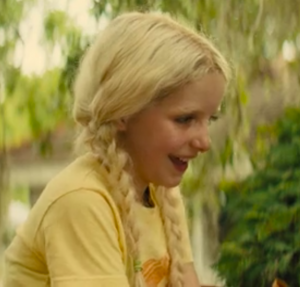
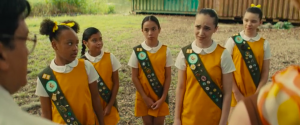
Anne-Claire, Hell-No, and Smash do not conform to typical “girl’s” behavior either. Anne-Claire is quiet and sweet, but she’s missing one of her eyes, and therefore not conventionally beautiful. The girls of Troop Five tease her constantly, and don’t view her as anything more than the girl with the missing eye. Hell-No may fall on the opposite end of the spectrum of not being a perfect woman: she is mean, bullies other kids for their lunches every day, and isn’t afraid to beat them up. Smash helps Hell-No with these missions and often acts as the brute force behind Hell-No’s threats. Smash also is not conventionally beautiful: she’s short and round, and says almost nothing until the very end of the movie–– choosing instead to smash whatever is closest to her.
Joseph is the one non-female member of Troop Zero, and certainly the only non-female Birdie in the entire organization. He has stereotypical feminine interests, like cheerleading, dancing, and hairdressing. He wears sparkly star-shaped sunglasses and chooses a dress for his Birdie uniform, though shorts are an option as well. Though his gender identity comes into question throughout the film, it doesn’t explicitly reveal his identity–– the film doesn’t categorize him as transgender or gay, but characters still question the possibility. Throughout the film, he’s referred to as a “little sparkly friend” (0:07:40-9), a “girl boy” (0:10:10-6), and “not even a real girl” (0:42:16-18), all hinting at the fact that he doesn’t conform to society’s idea of normal, either because of the gender that he identifies as, the his sexual identity, or merely because of his interests. Most of the time, the other characters seem to lack judgement when referring to him in such ways, but the mere fact that they call him sparkly or a girl boy indicates that his identity lies outside the societal norm. Gender is something that is determined and signified from birth, and with each binary gender comes different expectations spanning from what a person wears to how they act and what careers are acceptable. Gender, and each of these gendered expectations are entirely constructed by society, yet when someone like Joseph breaks those norms, they are scrutinized by those around them, whether or not they are accepted (Lorber 141-2).
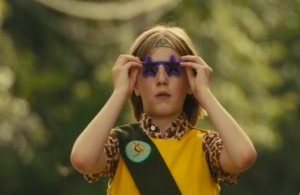
Class:
Socioeconomic class is another important aspect of this film. Money is something else that divides the stereotypical Troop Five from the less-accepted Troop Zero. Christmas and Joseph live next door to each other in somewhat rundown trailers, and Hell-No and Smash seem to live in a broken-down trailer in an overgrown field filled with old shipping containers. Viewers don’t get to see where the members of Troop Five live, but the fact that they are always clean and well-dressed suggests that they come from more affluent backgrounds, and Ms. Massey’s house is certainly nicer than any of Troop Zero’s.
 .
. 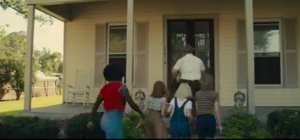
Troop Zero is continually punished for being poor. As Ms. Massey brings them what’s left of the cookies, uniforms, and badges from Troop Five, she cheerfully exclaims, “Leftovers for the leftovers!” (0:30:35-31:30). Not only is her opinion about Christmas’s new troop made clear, but she also puts the troop at a huge disadvantage as they each have to earn one badge in order to qualify for Jamboree and compete for inclusion on the Golden Record, and the badges that she left are sparse. Later, after Troop Zero has overcome several other hurdles in order to qualify for Jamboree, they head to Ms. Massey’s house to tell her that they have qualified. Only then does she bother to tell the troop that there is a $500 entrance fee for Jamboree, and Christmas’s father’s face falls (1:03:35-55). Though he and the town are eventually able to scrape together money for the fee, money is clearly a dividing factor between members of the town, especially as there are continual roadblocks that keep those with less money living in poverty.
Feminist Elements and the Message of Troop Zero:
**Here are where the spoilers come in**
So how do all of these elements tie together into the message of this film? Ultimately, “Troop Zero” is about love and acceptance of yourself and those around you. In terms of gender, Joseph earns his badge by cutting and styling the hair of five women in the town. They all love his work, and as Christmas tells the audience in a voiceover: “The beauty badge was made for Joseph. If he can make my hair less ugly, he can make the world less ugly,” (0:30:20-7). His work is appreciated for his skill, not because he was conforming to any gender role: he is truly talented at this art, and the town supports him for that. The rest of Troop Zero goes on to earn their badges in something useful to them, unique to their skill set, and something that they can take pride in. Through this process, each of the kids learn that they all have something to offer the world, and that they do belong. Before joining Troop Zero, society told them that they didn’t belong, that there was something wrong with them. But in Troop Zero they learned to love each other and to stick up for themselves and their friends, and this is demonstrated spectacularly when the troop finally makes it to Jamboree.
https://www.youtube.com/watch?v=AiSf8M90f2g
The scene above is packed with secondhand embarrassment, strength, and the solidarity of true friendship. It takes a special kind of bravery to stand in front of people who are laughing at you, to wet your pants from embarrassment, and continue with your performance. Christmas knows that she is not alone anymore, as she tells the audience “I hope… I hope you live a good life. And I hope you have a friend. I hope you got everything I got,” (1:21:50-22:07). It also takes a special kind of solidarity to join your friend, wet your pants alongside her, and continue with your performance–– and that is exactly what Troop Zero does. They don’t end up winning the competition, but they did find a family who loves them. Christmas and Joseph’s fathers as well as Rayleen and others from the town proudly support these children and everything about who they are.
“Troop Zero” ends with an unexpected meteor shower as the troop camps after Jamboree. As the first one streaks across the sky, Rayleen turns to Christmas and asks, “Think aliens have the same petty standards that we do? Hell no, they gonna hear you.” She sees the beauty in Christmas and all of her “boos,” which she affectionately calls the children of Troop Zero, and she loves them for who they are. Christmas then climbs on the picnic table, looks up at the sky, and states, “I’m here.” Then the others soon follow, looking up, and proclaiming their right to existence out into the universe (1:29:52-32:30).
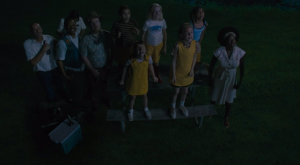
Poet, activist, and novelist Marge Piercy wrote in her poem “My Heroines,” “When I think of women heroes,/ it’s not Joan of Arc or Molly Pitcher/ but the mothers who quietly say/ to their daughters, you can,” (Piercy). That is the message that “Troop Zero” shares with its viewers: no matter who you are, where you come from, or who you want to be, you can. And with that encouragement comes the support and love from those who believe in you, no matter how many eyes you have, what gender you are or aren’t, or whether or not you wet your pants when you get nervous.
Works Cited:
Lorber, Judith. “The Social Construction of Gender.” Women’s Voices Feminist Visions: Classic and Contemporary Readings, Susan M. Shaw and Janet Lee, McGraw-Hill Education, 2015, 141-2.
Piercy, Marge. “My Heroines.” 2010.
Troop Zero. Directed by Bert and Bertie, performances by Viola Davis, Jim Gaffigan, and Mckenna Grace, Amazon Studios, 2019.
*all images taken from film